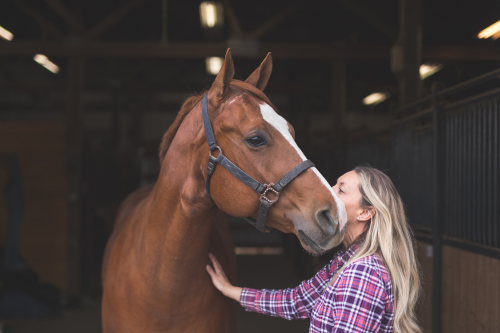As you probably know, horse ownership can be a hugely rewarding experience. However, the financial commitment can be overwhelming. Luckily, there’s another option- leasing! In choosing between leasing or owning a horse, you’ll want to consider many factors, such as budget, time commitment, and long-term goals.
Keep reading to learn about the pros and cons of both leasing and owning a horse to help you make an informed decision!
Why Own a Horse?
Owning a horse is a feeling like no other. When you own a horse, you can develop a deep, personal bond. Consistent care, training, and time spent together build trust and a strong relationship.
Another plus of owning a horse is that you have complete control over the horse’s care, training, and activities. You can tailor everything to suit your specific preferences and goals. You have total freedom to ride and work with your horse at any time without restrictions. Horse ownership can also be an investment for the future. If you train and develop your horse well, the horse can potentially increase in value- especially if it’s for competition.
The Costs of Owning a Horse
Owning a horse is a large financial investment that goes beyond the purchase price. Here are some of the most common costs of horse ownership:
Boarding
If you don’t have your own stable, boarding fees can range from $300 to $1,500 per month, depending on the location, facilities, and services provided. Full-service boarding facilities, which include feeding, stall cleaning, and turnout, tend to be more expensive.
Feed and Supplements
The cost of hay, grain, and supplements can add up to $150 to $300 per month. Special dietary needs or higher-quality feed will increase this cost.
Vet Care
Routine veterinary care, including vaccinations, dental work, and annual check-ups, can cost around $300 to $600 per year. Emergency veterinary care and surgeries can run into thousands of dollars.
Farrier
Regular hoof care is essential, with trimming and shoeing costs ranging from $40 to $200 every six to eight weeks.
Tack and Supplies
Tack, grooming supplies, blankets, and other necessary equipment are other significant upfront cost that varies greatly between disciplines. This equipment will also require ongoing maintenance and replacement.
Training and Lessons
If you plan to show your horse, you’ll want to invest in training and lessons. Professional training and riding lessons can cost $50 to $200 per session, ranging from a weekly to a monthly expense.
Insurance
Investing in insurance for your horse is always a good idea. This insurance will cover mortality, major medical, and liability, costing $300 to $1,000 annually, depending on the coverage.
Why Lease a Horse?
Leasing is typically less of a financial commitment than owning, making it a more accessible option for those with limited budgets. Lease fees vary widely based on the horse’s quality, the lease terms, and the location. Partial leases can range from $100 to $400 per month, while full leases can be $300 to $1,000 or more monthly.
In a partial lease, you can often share costs such as boarding, feed, and veterinary care with the owner. This arrangement significantly reduces the lessee’s financial burden. The horse’s insurance may be covered by the owner, or you may need to contribute to or purchase insurance to cover their riding activities and the horse’s well-being.
Leases typically provide a lot of flexibility. They’re usually short-term agreements, allowing individuals to assess their interest and commitment to horse riding without a long-term obligation. Also, the horse’s owner retains ultimate responsibility for the animal’s care, reducing your workload and stress.
Finally, leasing provides the opportunity to ride and compete on well-trained and experienced horses that might be unaffordable to buy. This is a great option if you want to compete at higher levels and aren’t able to buy a horse with that training.
The Downside of Leasing a Horse
While there are many great reasons to lease a horse, there are also some pitfalls. As a lessee, you must adhere to the owner’s rules and preferences regarding the horse’s care, training, and use. Also, lease agreements may limit your riding time and access to the horse, which can be frustrating if you’re a serious rider.
Additionally, as a lessee, you don’t benefit from any potential increase in the horse’s value or the long-term bond that comes with ownership. Lease agreements can also be terminated by the owner, sometimes with little notice, which can disrupt your riding plans. Choosing between leasing and owning a horse depends on your financial situation, time availability, and long-term goals.
Ownership offers the chance to form a deep bond and have complete control over the horse’s care, but it comes with high costs and a lot of responsibilities. Leasing provides a more affordable and flexible alternative with fewer responsibilities but limited control. Carefully weigh the pros and cons of each option to determine the best path for your horse journey!
